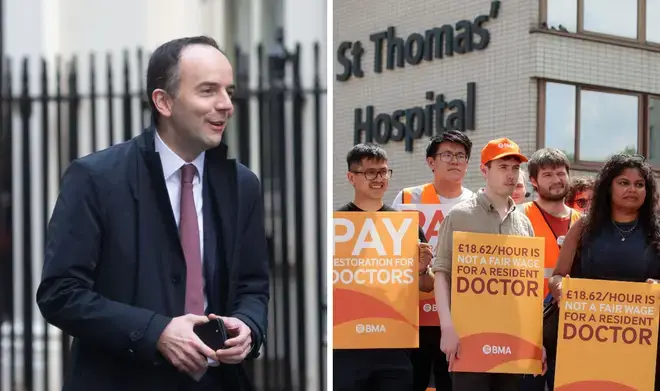The BMA is losing the support of the public and some of their own doctors over the resident doctors’ strike, James Murray has told LBC.
The Exchequer Secretary to the Treasury has condemned the British Medical Association (BMA), telling Iain Dale they are “haemorrhaging public support” over the resident doctor’s strike.
Resident doctors, or junior doctors as they were previously known, across England have begun a five-day walk out after the Health Secretary refused their demands of a 29 per cent pay rise.
Mr Murray told LBC it is “incredibly disappointing” that the BMA’s leadership “rushed into” strike action.
“I think it must be the first union in history to get a 28.9% pay increase and then immediately go out on strike.
“It puts a lot of pressure obviously on the NHS, on patients, on all the other NHS staff who are, who are carrying the load.
I think it's worth pointing out that the BMA leadership, they are haemorrhaging public support over this. I think they're even losing the support of some of their own doctors who are on strike.”
The BMA, the organisation manning the picket lines, is pushing for the increase to match how much it claims doctors’ pay has fallen since 2008-09.
The government has condemned the walkout amid warnings over the stress it will put the NHS under, but Health Secretary Wes Streeting has refused to improve his 5.4% pay offer.
“It's deeply disappointing and actually, you know, unreasonable, for them to then go on strike so immediately, having got such a big pay rise when the offer was there to continue having constructive conversations about how else we can support them,” Mr Murray said.
“So, you know, they've taken the wrong call on this. It's reckless and unreasonable and it's not what we want to see happen.
“Because, as I said, we want to build on the really great progress we've made in the first year. Four and a half million extra appointments, waiting list down by 260,000, record capital investment in the NHS. We need to build on that rather than these strikes going ahead.”
Treasury minister James Murray speaks to Iain Dale
The last round of strikes, which also included walkouts by other health workers, came at an estimated cost of £1.5 billion to the NHS in England.
Some 1.5 million appointments, procedures and operations were postponed as a result of the stoppages.
NHS England’s chief executive, Sir Jim Mackey, has called on hospital leaders not to cancel routine appointments during the strikes, a different approach from previous walkouts.
During the 2024 strike, a “Christmas Day” approach was adopted, meaning only urgent treatments and A&E visits took place.
BMA leaders called on Mackey to reverse his decision, warning it would “put patients at risk” and spread doctors “too thinly.”
Mr Murray said this will be better for patients as they will be able to attend their appointments, but admitted it will “put a lot of stress on NHS staff”.
The treasury minister said: “One of the differences you can see in terms of how the strikes are playing out now versus what happened before is that we've made really clear that NHS trusts should avoid cancelling planned care as well as urgent care.
“So what's happened in previous strikes under previous governments is that urgent care has been protected, but planned care has been postponed. Now, we know that has a really big impact on people's lives, and so we've asked NHS trusts to protect that planned care as well.
“And the chief Executive of the NHS has said it's early days, but it looks like around 95% of planned care procedures are continuing, which is obviously good news, although it puts a lot of stress on those NHS staff who are helping to make this happen, and we owe them a huge thanks for making that happen”.
The previous strikes ended last September when resident doctor members voted to accept a Government pay deal worth 22.3% on average over two years.
The 2025/26 pay deal saw resident doctors given a 4% increase plus £750 “on a consolidated basis”, working out as an average rise of 5.4%.
Government officials said these two increases equate to a 28.9% pay rise.
But the BMA said resident doctors need 29.2% to reverse “pay erosion” since 2008/09.
Earlier this month, the union announced that resident doctors in England would strike for five days from 7am on July 25.


